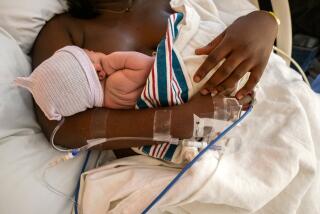Poll Finds Doctors’ AIDS Bias Greater in Minority Areas : Medicine: Physicians in non-Anglo sections of L.A. County are reported more averse to treating such patients.
- Share via
Primary-care physicians who practice in minority communities in Los Angeles County are generally less attuned to the threat of AIDS and more averse to treating persons infected with the virus than their colleagues in Anglo communities, a survey has found.
The findings, discussed Friday in a meeting of the Los Angeles County Commission on AIDS, are particularly troubling in light of the increasing spread of the human immunodeficiency virus (HIV) within the black and Latino communities, commissioners said.
The study, which was sponsored by the Southern California AIDS Education and Training Center and is to be published Jan. 12 in the Western Journal of Medicine, augments and in some ways parallels a recent national survey that found nearly one-third of all primary care physicians do not agree that they have a responsibility to treat people with AIDS--a view that many doctors say flouts the Hippocratic oath to provide compassionate care to the sick.
Dr. Charles E. Lewis, professor of medicine at the UCLA Medical Center and an author of the county study, said many Southern California physicians share biases against groups hard hit by HIV--specifically homosexuals and intravenous drug users. They also fear infection themselves and the prospect that HIV patients could alienate other clients, he said.
“We just have a fair amount of physicians who obviously have chosen not to keep these patients in their practice,” Lewis said.
Resistance is so strong among many physicians, Lewis said, that attempting to alter their attitudes would be a waste of time and effort.
The study reinforced belief that many doctors, particularly in minority communities, remain inadequately informed about HIV and AIDS. Such physicians represent a key problem in addressing the epidemic, said Dr. Wilbert Jordan, a commissioner and head of the AIDS clinic at Martin Luther King-Drew Medical Center.
Physicians who are unfamiliar with HIV, Jordan said, may treat a woman whose husband is secretly bisexual or an intravenous drug user for months before even testing for the virus. “How much time do we lose?” he asked.
Dr. Aliza Lifshitz, a Latina commissioner who works in a Spanish-speaking community, was appointed Friday to lead an effort to increase HIV education for physicians in minority communities and to create an HIV information network for doctors.
In conducting their survey, Lewis and his colleagues interviewed about 400 of the 4,000 primary care physicians serving Los Angeles County. They compared responses of doctors who are graduates of medical schools in the United States to those who graduated from foreign medical programs. Generally, foreign medical graduates are more likely to serve minority communities, Lewis said.
The survey found that foreign medical graduates are more likely to refer patients with HIV to other physicians, who would serve as their primary-care physicians.
Moreover, U.S. graduates who treat HIV were far more likely to prescribe the anti-viral drug AZT than foreign-educated doctors who treat HIV. AZT has become an increasingly popular treatment for persons with HIV.
Dr. Thomas Horowitz, chairman of the AIDS commission, emphasized that many physicians who refer HIV patients to other doctors act out of a sense of responsibility, because they are aware of their own lack of expertise, and not necessarily because of personal prejudice. Inadequate Medicaid reimbursements is also “a big, big issue” with HIV cases, Dr. Lifshitz added.
HIV is now carried by an estimated 1 million people in the United States, according to the Centers for Disease Controls. The virus is not so esoteric, physicians say, that primary-care doctors should shy away from such patients.
“The toughest HIV patient is the first,” Lewis said. “After that, it’s easy.”
More to Read
Sign up for Essential California
The most important California stories and recommendations in your inbox every morning.
You may occasionally receive promotional content from the Los Angeles Times.













